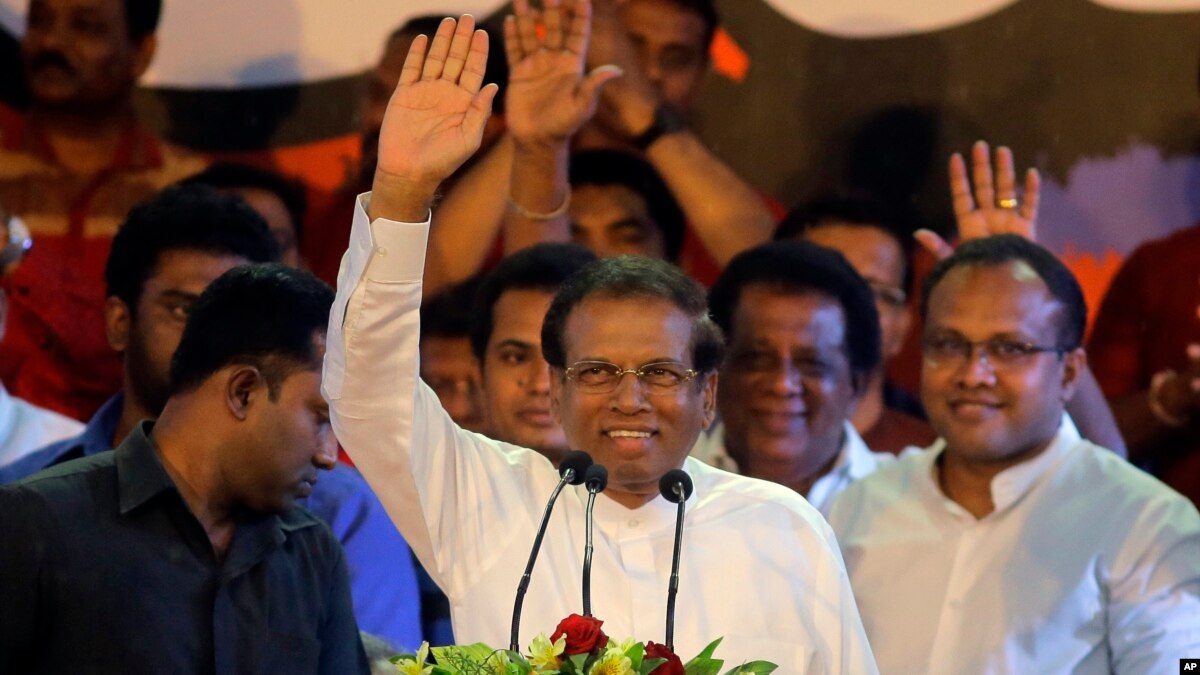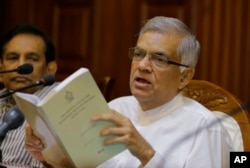
[ad_1]
Sri Lanka’s president dissolved Parliament and called for elections on Jan. 5 in a bid to stave off a deepening political crisis over his dismissal of the prime minister that opponents say is unconstitutional.
An official notification signed by President Maithripala Sirisena announced the dissolution of Parliament effective midnight Friday. It said the names of candidates will be called before Nov. 26 and the new Parliament is to convene Jan. 17.
Sri Lanka has been in a crisis since Oct. 26, when Sirisena fired his prime minister, Ranil Wickremesinghe, and replaced him with former strongman Mahinda Rajapaksa. Both say they command a majority in Parliament and had been expected to face the 225-member house Wednesday after it was suspended for about 19 days.
Foreign Minister Sarath Amunugama told The Associated Press Saturday that the reason for the president to dissolve Parliament was the need to go to the people to find a resolution to the crisis.
“On the 14th there was to be a lot of commotion and unparliamentary activities sponsored by the speaker,” Amunugama said. “The speaker was not planning to act according to the constitution and standing orders of Parliament.”
Sirisena’s supporters had been irked by Speaker Karu Jayasuriya’s announcement that he was going to call for a vote for either party to prove their support.
Miscalculation
“The dissolution clearly indicates that Mr. Sirisena has grossly misjudged and miscalculated the support that he might or could secure to demonstrate support in the Parliament,” said Bharath Gopalaswamy, director at U.S.-based analyst group Atlantic Council’s South Asia Center. “At the end of the day, he is a victim of his own homegrown crisis.”
Wickremesinghe has insisted his firing is unconstitutional. He has refused to vacate his official residence and demanded that Parliament be summoned immediately to prove he had support among its members.
Tensions had been building between Sirisena and Wickremesinghe for some time, as the president did not approve of economic reforms introduced by the prime minister. Sirisena has also accused Wickremesinghe and another Cabinet member of plotting to assassinate him, a charge Wickremesinghe repeatedly denied.
Sirisena was critical of investigations into military personnel accused of human rights violations during Sri Lanka’s long civil war against a Tamil separatist group, which ended in 2009. Rajapaksa, who ruled as president from 2005 to 2015, is credited as a hero by the ethnic Sinhalese majority for winning the conflict. But he lost a re-election bid in 2015 amid accusations of nepotism, corruption and wartime atrocities.
Constitutional question
Wickremesinghe’s camp is likely to contest Sirisena’s move because of constitutional provisions stating a Parliament can’t be dissolved until 4 ½ years after its election. The current Parliament was elected in August 2015.
“It’s totally unconstitutional,” said Harsha de Silva, a member of Wickremesinghe’s United National Party and a former minister. “Sirisena has relegated the constitution to toilet paper. We will fight this dictator to the end.”
The party said in a Twitter message that it will meet the elections commissioner to discuss the constitutionality of Sirisena’s move.
US urges caution
The U.S. State Department tweeted that it is deeply concerned by news the Sri Lanka Parliament will be dissolved, “further deepening the political crisis.”
“As a committed partner of Sri Lanka, we believe democratic institutions and processes need to be respected to ensure stability and prosperity,” the statement said.
Earlier, U.S. Rep. Eliot Engel, the top-ranking Democrat on the House Foreign Affairs Committee, and two other lawmakers wrote to Sirisena warning that actions circumventing the democratic process could impact U.S. assistance, including a planned five-year aid package from the Millennium Challenge Corporation worth hundreds of millions of dollars.
